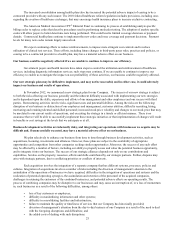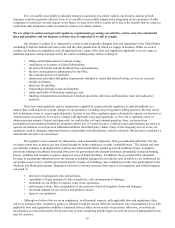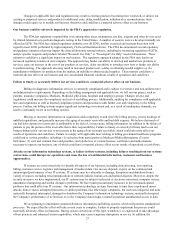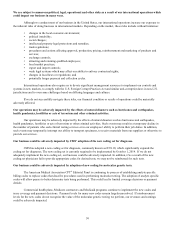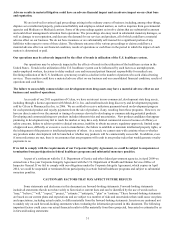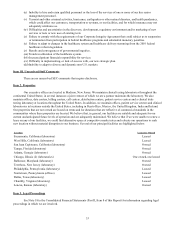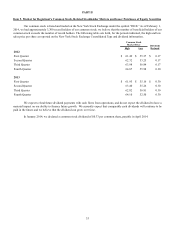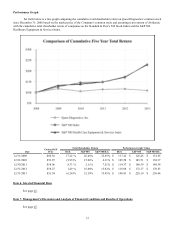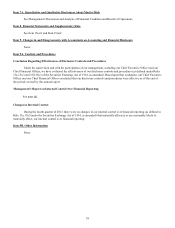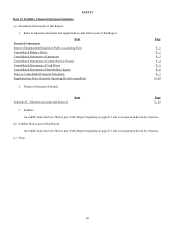Quest Diagnostics 2013 Annual Report Download - page 34
Download and view the complete annual report
Please find page 34 of the 2013 Quest Diagnostics annual report below. You can navigate through the pages in the report by either clicking on the pages listed below, or by using the keyword search tool below to find specific information within the annual report.30
We are subject to numerous political, legal, operational and other risks as a result of our international operations which
could impact our business in many ways.
Although we conduct most of our business in the United States, our international operations increase our exposure to
the inherent risks of doing business in international markets. Depending on the market, these risks include without limitation:
• changes in the local economic environment;
• political instability;
• social changes;
• intellectual property legal protections and remedies;
• trade regulations;
• procedures and actions affecting approval, production, pricing, reimbursement and marketing of products and
services;
• exchange controls;
• attracting and retaining qualified employees;
• local market practices;
• export and import controls;
• weak legal systems which may affect our ability to enforce contractual rights;
• changes in local laws or regulations; and
• potentially longer payment and collection cycles.
International operations also require us to devote significant management resources to implement our controls and
systems in new markets, to comply with the U.S. Foreign Corrupt Practices Act and similar anti-corruption laws in non-U.S.
jurisdictions and to overcome challenges based on differing languages and cultures.
If we do not successfully navigate these risks, our financial condition or results of operations could be materially
adversely affected.
Our operations may be adversely impacted by the effects of natural disasters such as hurricanes and earthquakes,
health pandemics, hostilities or acts of terrorism and other criminal activities.
Our operations may be adversely impacted by the effects of natural disasters such as hurricanes and earthquakes,
health pandemics, hostilities or acts of terrorism or other criminal activities. Such events may result in a temporary decline in
the number of patients who seek clinical testing services or in our employees' ability to perform their job duties. In addition,
such events may temporarily interrupt our ability to transport specimens, to receive materials from our suppliers or otherwise to
provide our services.
Our business could be adversely impacted by CMS' adoption of the new coding set for diagnoses.
CMS has adopted a new coding set for diagnosis, commonly known as ICD-10, which significantly expands the
coding set for diagnoses. The new coding set is currently required to be implemented by October 1, 2014. If we do not
adequately implement the new coding set, our business could be adversely impacted. In addition, if as a result of the new
coding set physicians fail to provide appropriate codes for desired tests, we may not be reimbursed for such tests.
Our business could be adversely impacted by adoption of new coding for molecular genetic tests.
The American Medical Association CPT® Editorial Panel is continuing its process of establishing analyte specific
billing codes to replace codes that describe procedures used in performing molecular testing. The adoption of analyte specific
codes will allow payers to better determine tests being performed. This could lead to limited coverage decisions or payment
denials.
Commercial health plans, Medicare contractors and Medicaid programs continue to implement the new codes and
issue coverage and payment decisions. Payment levels for many new codes remain largely unresolved. If reimbursement
levels for the new codes do not recognize the value of the molecular genetic testing we perform, our revenues and earnings
could be adversely impacted.







